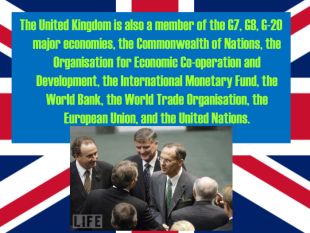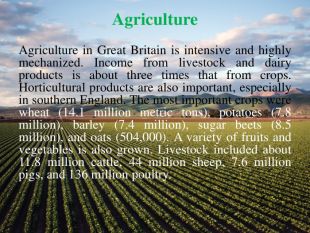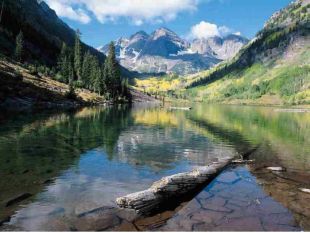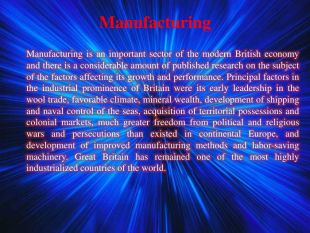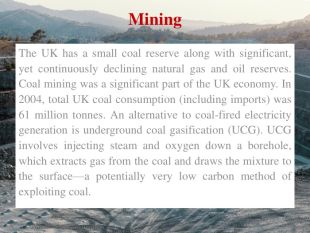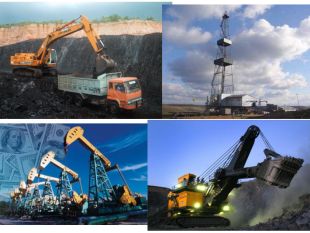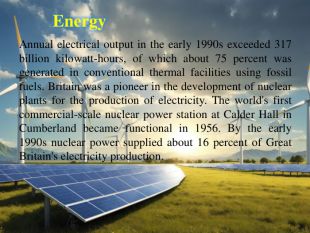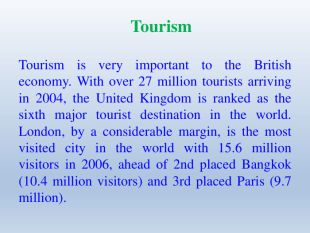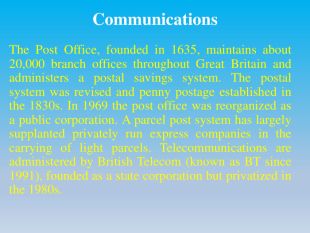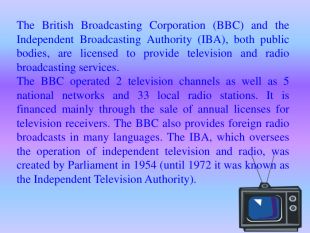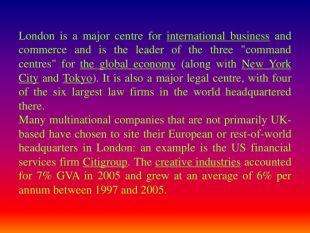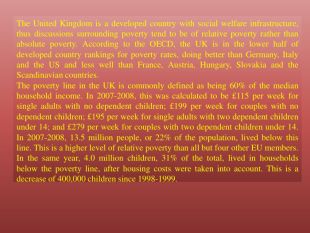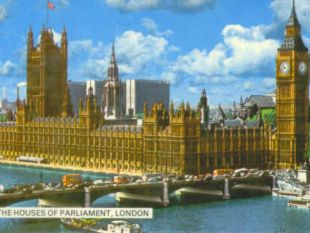Урок на тему: «Економіка Великої Британії»
Управління освіти і науки в Житомирській облдержадміністрації
Баранівський професійний ліцей
Конспект урок з англійської мови для 10 класу на тему:
«Економіка Великої Британії»
Розробив:
викладач іноземної мови та зарубіжної літератури
Волошин Віталій Миколайович
Lesson №
Topic: «Economy of Great Britain»
Educational aim: to systematize students’ knowledge of topic and give them more information about the economy of Great Britain.
Practical aim: to practice students’ vocabulary skills;
Developmental aim: to develop students’ reading, writing and socio-cultural skills.
Cultural aim: to educate respect for the history of the country.
Equipment: textbooks, pictures, handouts.
Course of the lesson
I. Introduction.
1. Greeting, introduction of the topic of the lesson.
T: Good morning. How are you? Today we are going to start a new topic «Economy of Great Britain» and revise general information about British economy.
2. Warming-up.
T: Letʼs speak about Economy. Answer my questions.
1. What is an economy?
2. What is the main task of economy?
3. What role does economy play in our society?
4. What are «three whales of economy»?
5. What natural resources do you know?
6. What natural resource we use at home for cooking?
7. What is a capital in economics?
8. What is a labour?
9. What branches of economy do you know?
10. What branches of agriculture do you know?
11. What branches of industry do you know?
12. What kind of goods produces each branch of industry?
Possible answers:
1. An economy is an area of the production, distribution and trade, as well as consumption of goods and services by different agents. (Економіка ‒ область виробництва, розподілу та торгівлі, а також споживання товарів та послуг різними агентами.)
2. Economists study the ways a society uses scarce resources such as land, labor, raw materials, and machinery to produce goods and services. (Економісти вивчають способи використання суспільством обмежених ресурсів, таких як земля, робоча сила, сировина та машини для виробництва товарів та послуг.)
3. There is an economic role, such as provide for national defense, address environment concerns, protect property rights, and make market more competitive, for government in a market economy whenever the benefits of a government policy outweigh its costs. (Існує така економічна роль, як забезпечення національної оборони, вирішення проблем щодо навколишнього середовища, захист прав власності та підвищення ринку більш конкурентоспроможним для уряду в умовах ринкової економіки, коли переваги урядової політики перевищують його витрати.)
4. Industry, Agriculture, Service.
5. Natural resources are air, water, wood, oil, wind energy, natural gas, iron, and coal.
6. Natural gas, electricity, agricultural products.
7. In economics, capital consists of assets that can enhance one's power to perform economically useful work. (В економіці капітал складається з активів, які можуть підвищити власні сили для виконання економічно корисної роботи.)
8. Labour: 1) physical or mental work, especially of a hard or fatiguing kind; 2) a job or task done or to be done. (Праця: 1) фізична або розумова робота, особливо важка або стомлювальна; 2) робота чи завдання, яке виконане або має бути виконане.)
9. Macroeconomics & Microeconomics.
10. The five branches are: Agronomy; Horticulture; Agricultural Engineering; Agricultural Economics; Animal Science. (Пʼять галузей: Агрономія; Садівництво; Сільськогосподарське машинобудування; Економіка сільського господарства; Наука про тварин.)
11. Industry sectors: Primary sector of industry (the raw materials industry); Secondary sector of industry (manufacturing and construction); Tertiary sector of industry (the «service industry»); Quaternary sector of industry (intellectual services industry).
(Галузі промисловості: Первинний сектор галузі (сировинна промисловість); Вторинний галузь промисловості (виробництво та будівництво); Третинний сектор галузі («сфера послуг»); Четвертичний галузь промисловості (галузь інтелектуальних послуг).)
12. 1) equipment and details; 2) equipment, machinery (техніка, устаткування), buildings; 3) everyday goods and services; 4) intellectual services.
II. Checking homework.
Students tell about political system of Great Britain.
III. Main part of the lesson.
1. Vocabulary practice.
1.1. Write down new lexical material into your vocabularies.
1) agricultural production – сiльськогосподарська промисловість;
2) power industry – електроенергетика;
3) fuel industry – паливна промисловість;
4) metallurgical industry – металургійна промисловість;
5) machine-building – машинобудування;
6) building industry – будівельна промисловість;
7) chemical industry – хімічна промисловість;
8) mining industry – гірничодобувна промисловiсть;
9) cellulose paper industry – целюлозно-паперова промисловість;
10) automobile industry – автомобільна промисловість;
11) shipbuilding – суднобудування;
12) aircraft industry – авіаційна промисловість;
13) electronic engineering – електротехніка;
14) light industry – легка промисловiсть;
15) textile – текстильна промисловість;
16) food industry – харчова промисловість.
1.2. Choose the right variant of answer.
1. The main aim of economy is:
a) economical usage of natural resources;
b) satisfing the consumersʼ needs;
c) development of industries.
2. The three whales of economy are:
a) natural resources, capital, labour;
b) industry, agriculture, service;
c) property, trade, manufacture.
3. The deposits of iron ore, coal, oil, gas, firtile soil, forests, fresh water belong to:
a) labour;
b) natural resources;
c) capital.
4. The branch which provides economy with oil, gas, coal is:
a) metallurgical industry;
b) chemical industry;
c) mining industry.
5. The branch which provides economy with metal:
a) machine-building;
b) metallurgical industry;
c) mining industry.
6. The branch which provides economy with products:
a) mining industry;
b) light industry;
c) food industry.
7. The branch which produces clothes, footwear, cloth:
a) light industry;
b) chemical industry;
c) cellulose paper industry.
8. The branch which produces machinery and equipment:
a) metallurgical industry;
b) power industry;
c) machine-building.
9. The branch which provides economy with crops, milk, meat:
a) agriculture;
b) food industry;
c) light industry.
10. The branch which provides economy with synthetic materials:
a) building industry;
b) chemical industry;
c) food industry.
11. The branch which produces energy:
a) metallurgical industry;
b) mining industry;
c) power industry.
12. The branch which produces concrete, brick, sand, chalk:
a) machine-building;
b) building industry;
c) chemical industry.
13. The branch which produces TV-sets, computers, cameras:
a) power industry;
b) machine-building;
c) electronic engineering.
14. The branch which provides economy with paper:
a) chemical industry;
b) cellulose paper industry;
c) building industry.
15. The branch which provides economy with cars:
a) shipbuilding;
b) machine-building;
c) automobile industry.
Keys: 1 ‒ b; 2 ‒ b; 3 ‒ b; 4 ‒ c; 5 ‒ b; 6 ‒ c; 7 ‒ a; 8 ‒ c; 9 ‒ a; 10 ‒ b; 11 ‒ c; 12 ‒ b; 13 ‒ c; 14 ‒ b; 15 ‒ c.
1.3. Find the right translation.
1) agricultural production
2) power industry
3) metallurgical industry
4) machine-building
5) building industry
6) chemical industry
7) mining industry
8) cellulose paper industry
9) automobile industry
10) shipbuilding
11) aircraft industry
12) electronic engineering
13) light industry
14) textile industry
15) food industry
a) електротехніка;
b) автомобільна промисловість;
c) текстильна промисловість;
d) машинобудування;
e) целюлозно-паперової промисловості;
f) сiльськогосподарська промисловість;
g) харчова промисловість;
h) авіаційна промисловість;
i) електроенергетика;
j) металургійна промисловість;
k) легка промисловiсть;
l) будівельна промисловість;
m) гірничодобувна промисловiсть;
n) суднобудування;
o) хімічна промисловість.
Keys: 1 ‒ f; 2 ‒ i; 3 ‒ j; 4 ‒ d; 5 ‒ l; 6 ‒ o; 7 ‒ m; 8 ‒ e; 9 ‒ b; 10 ‒ n; 11 ‒ h; 12 ‒ a; 13 ‒ k; 14 ‒ c; 15 ‒ g.
1.4. Column A gives the names of the industries. In column B, find the names of the products they produce. Combine columns A and B.
|
А |
В |
|
1) agricultural production 2) power industry 3) metallurgical industry 4) machine-building 5) building industry 6) chemical industry 7) mining industry 8) cellulose paper industry 9) automobile industry 10) shipbuilding 11) aircraft industry 12) electronic engineering 13) light industry 14) textile industry 15) food industry
|
a) planes, spacecrafts, missiles; b) iron, manganese, titanium and uranium ores; c) chemicals, fertilizers, plastics, synthetic materials; d) wheat, barley and oats (пшениця, ячмінь та овес); e) steel, iron, cast iron; f) turbines, plant equipment, industrial robots, electric motors; g) passenger cars; h) canned food products (консервовані харчові продукти); i) paper and paper products; j) tractors, combines, excavators; k) household appliances, including refrigerators, washing machines, and TV-sets; l) ocean liners, sea and river vessels (океанські лайнери, морські та річкові судна); m) pottery, china, sand; n) copper, zinc, graphite, coal, silver, gold; o) bread, cakes, cookies, sweets; p) hydroelectric power station, thermal power station, nuclear power station; q) cotton, silk, chiffon; r) cement, limestone, concrete, brick (цемент, вапняк, бетон, цегла); s) natural gas and oil; t) diesel locomotives, railway cars, trains; u) clothes, linen, footwear; v) precision instruments, electron microscopes; w) detergents, shampoos, creams, cosmetics (миючі засоби, шампуні, креми, косметика); x) fruit, vegetables and farm products. |
Keys: 1 ‒ d, x; 2 ‒ p; 3 ‒ b, e; 4 ‒ f, t; 5 ‒ r; 6 ‒ c, w; 7 ‒ n, s; 8 ‒ i; 9 ‒ g, j; 10 ‒ l; 11 ‒ a; 12 ‒ k, v; 13 ‒ m, u; 14 ‒ q; 15 ‒ h, o.
2. Speaking.
T: Which of the following factors are most important for the development of agriculture / mining industry / fuel industry? Which are the least important?
(Які з факторів, зазначених нижче, найбільш важливі для розвитку сільського господарства / гірничої промисловості / паливної промисловості? Які найменш важливі?)
• mineral resources;
• soil;
• well-developed metallurgy;
• well-developed export-import relations with other countries;
• mountains;
• climate;
• relief of the land;
• deposits of oil and gas;
• water resources.
Keys:
Agriculture:
• climate;
• water resources;
• relief of the land.
Mining industry:
• mineral resources;
• soil;
• mountains.
Fuel industry:
• deposits of oil and gas;
• well-developed export-import relations with other countries;
• well-developed metallurgy.
3. Reading.
T: Read and translate the text.
Economy of Great Britain
The United Kingdom is one of the world’s largest exporters of manufactured goods per head of population. For every person employed in agriculture eleven people are employed in mining, manufacturing and building.
Apart from coal and iron ore Britain has very few natural resources. Its agriculture provides only half the food it needs. Most of the raw materials such as oil and various metals (copper, zinc, uranium ore and others) have to be imported. Britain also has to import timber, cotton, fruit and farm products.
Britain used to be richly forested, but most of the forests were cut down to make more room for cultivation. The greater part of land is used for cattle and sheep breeding, and pig raising. Among the crops grown on the farms are wheat, barley and oats. The fields are mainly in the eastern part of the country. Most of the farms are small. Farms tend to be bigger where the soil is less fertile.
Britain produces high quality expensive goods, which has always been characteristic of its industry. A shortage of raw materials, as well as the high cost of production makes it unprofitable for British industry to produce semi-finished goods or cheap articles. Britain mostly produces articles, requiring skilled labour, precision instruments, chemicals. Britain high quality consumer goods and articles made of various kinds of synthetic (man-made) materials.
The original basis of British industry was coal mining, and the early factories grew up not far from the main mining areas.
Glasgow and Newcastle became great centres of engineering and shipbuilding. Lancashire produced cotton goods and Yorkshire woollens, with Sheffield concentrating on iron and steel. Birmingham developed light engineering. There appeared a tendency for industry and population to move to the south, particularly to the London area. Britain’s industry is now widely dispersed. Great progress was made in the development of new industries, such as the aircraft, automobile, electronic industries and others. A number of atomic power reactors were made. Great emphasis was made on the development of the war industry.
Економіка Великобританії
Сполучене Королівство є одним з найбільших експортерів вироблених товарів у світі на душу населення. На кожну людину, зайнятої у сільському господарстві, одинадцять людей зайняті у гірничій промисловості, виробництві та будівництві.
Крім вугілля та залізної руди, у Британії є дуже мало природних ресурсів. Сільське господарство забезпечує лише половину необхідного продовольства. Більшість сировини, наприклад, нафту та різні метали (мідь, цинк, уранову руду та інші), потрібно імпортувати. Великобританія також змушена імпортувати деревину, бавовну, фрукти та сільськогосподарські продукти.
Британія завжди була багата на ліси, але більшість лісів були вирубані, щоб зробити більше місця для вирощування. Більша частина земель використовується для скотарства і вівчарства, та свинарства. Серед сільськогосподарських культур, вирощених на фермах, є пшениця, ячмінь та овес. Поля знаходяться головним чином у східній частині країни. Більшість господарств невеликі. Господарства, як правило, є більшими там, де ґрунт менш родючий.
Британія виробляє високоякісні дорогі товари, що завжди було характерним для її галузі. Дефіцит сировини, а також висока вартість виробництва робить британській промисловості невигідним виробництво напівфабрикатів або дешевих виробів. Британія в основному виробляє вироби, що вимагають кваліфікованої праці, точних інструментів, хімікатів. Британія ‒ споживч високоякісних товарів та виробів з різних видів синтетичних (рукодільних) матеріалів.
Початковою основою британської промисловості був видобуток вугілля, а ранні заводи виросли недалеко від основних гірничих районів.
Глазго та Ньюкасл стали великими центрами інженерингу та суднобудування. Ланкашир виробляв бавовняні вироби, а Йоркширські вовняні фабрики разом із Шефілдом, зосереджуються на залізі та сталі. Бірмінгем розвинув світлотехніку. Виявилася тенденція пересування промисловості та населення на південь, особливо до району Лондона. Зараз промисловість Великобританії широко розповсюджена. Великий прогрес був досягнутий у розвитку нових галузей промисловості, таких як авіабудування, автомобілебудування, електроніка та ін. Було виготовлено ряд атомних енергетичних реакторів. Великий акцент робився на розвитку військової промисловості.
Vocabulary:
1) manufactured goods – промислові товари;
2) per head of population – на душу населення;
3) apart of smth. – крім чогось;
4) used to be smth. – був кимось колись;
5) used to do smth. – робив щось колись;
6) to make room for smth. – звільняти простір (місце) для чогось;
7) to breed smth. – розводити, вирощувати (тварин);
8) to tend to do smth. – мати тенденцію робити щось;
9) article – виріб, товар, предмет виробництва;
10) to require smth. (doing smth.) – вимагати, потребувати чогось (робити щось);
11) precision instruments – точні інструменти;
12) to be widely dispersed – широко розповсюджуватись;
13) to make emphasis on smth. – надавати чомусь особливого значення, приділяти комусь особливу увагу;
14) raw materials – сировина;
15) soil – грунт;
16) fertile – родючий;
17) semi-finished goods – напівфабрикати;
18) chemicals – хімічні препарати.
3.1. Find the English equivalent for the following Ukrainian vocabulary in the right-hand column.
1. недостатня кількість сировини
2. дорогі товари високої якості
3. свинарство
4. вівчарство (розведення овець)
5. ввозити деревину
6. бути багатим на ліси
7. різноманітні метали
8. сировина
9. звільняти місце
10. військова промисловість
11. синтетичні матеріали
12. точні інструменти
13. атомний реактор
14. електронне обладнання
15. напівфабрикати
16. початкова основа
a) raw materials;
b) various metals;
c) to be richly forested;
d) to import timber;
e) to make room for smth.;
f) sheep breeding;
g) pig raising;
h) high quality expensive goods;
i) shortage of raw materials;
j) semi-finished goods;
k) precision instruments;
l) electronic equipment;
m) man-made materials;
n) the original basis;
o) atomic power reactor;
p) war industry.
Keys: 1 ‒ i; 2 ‒ h; 3 ‒ g; 4 ‒ f; 5 ‒ d; 6 ‒ c; 7 ‒ b; 8 ‒ a; 9 ‒ e; 10 ‒ p; 11 ‒ m; 12 ‒ k; 13 ‒ o; 14 ‒ l; 15 ‒ j; 16 ‒n.
3.2. Define the following sentences are true or false according to the text. Correct false sentences.
1. The United Kingdom is the largest exporter of manufactured goods. +
2. Britain is rich in very few natural resources. +
3. Britain has to import coal and iron ore. - (timber, cotton, fruit and farm products)
4. The greater part of land is used for sheep breeding, pig raising and flower growing. - (cattle breeding)
5. Britain produces high quality cheap goods. - (expensive goods)
6. Britain mostly produces articles requiring skilled labour, precision instruments and electronic equipment. +
7. Britain exports cotton and woollen goods but not leather goods. - (manufactured goods)
8. Coal mining was the original basis of British industry. +
9. Aircraft, automobile and electronic industries are new Britain’s industries. +
10. Glasgow is famous for engineering and shipbuilding. +
Keys: 1 +; 2 +; 3 -; 4 -; 5 -; 6 +; 7 -; 8 +; 9 +; 10 +.
4. Writing.
T: Complete the following sentences.
1. Great Britain is rich in ... . 2. Britain has very few ... . 3. Britain also has to import ... . 4. Most of the forests were cut down to ... . 5. Among the crops grown on the farms are ... . 6. Britain produces high quality ... . 7. Britain mostly produces article requiring ... . 8. Britain produces and exports ... . 9. The original basis of British industry was ... . 10. Great emphasis was made on the development of the ... .
Keys: 1 ‒ forests; 2 ‒ natural resources; 3 ‒ timber, cotton, fruit and farm products; 4 ‒ make more room for cultivation; 5 ‒ wheat, barley and oats; 6 ‒ expensive goods; 7 ‒ skilled labour, precision instruments, chemicals; 8 ‒ manufactured goods; 9 ‒ coal mining; 10 ‒ war industry.
5. Grammar practice.
T: Fill in the blanks with prepositions.
1. Britain produces goods and articles made ... various kinds of synthetic materials.
2. For every person employed ... agriculture, eleven people are employed ... mining, manufacturing and building.
3. Most ... the raw materials have to be imported.
4. The fields are mainly ... eastern part ... the country.
5. A shortage ... raw materials makes it unprofitable ... British industry to produce semi-finished goods or cheap articles.
6. Sheffield is concentrating ... iron and steel.
7. A present industry has a tendency to move ... the south, particularly ... the London area.
8. Great emphasis was made ... the development of the war industry.
Keys: 1 ‒ of; 2 ‒ in, in; 3 ‒ of; 4 ‒ in, of; 5 ‒ of, for; 6 ‒ on; 7 ‒ to, to; 8 ‒ on.
IV. Final part of the lesson.
1. Home task.
Prepare project about the economy of Great Britain.
(Підготувати проект про економіку Великої Британії)
2. Summing-up.
T: Let’s summarize our material. Answer the following questions.
1. What natural resources does Great Britain have?
2. What raw materials does Britain import?
3. Why does Britain have to import raw materials?
4. What does Britain export?
5. What is the characteristic feature of British industry?
6. Why is it unprofitable for Britain to produce semi-finished goods or cheap articles?
7. What are the main articles produced by British industry?
8. What are Britain’s traditional industries?
9. What are Britain’s main industries today?
10. What are the main industrial centres of Great Britain?
11. What are the main branches of British agriculture?
12. What is the greater part of land used for?
13. What crops are grown on the farms of Britain?
14. Why does Great Britain have to import farm products?
T: What was this lesson about? Did you like it? What new did you learn today? What was the most difficult for you at this lesson? Your marks are … .


про публікацію авторської розробки
Додати розробку

































